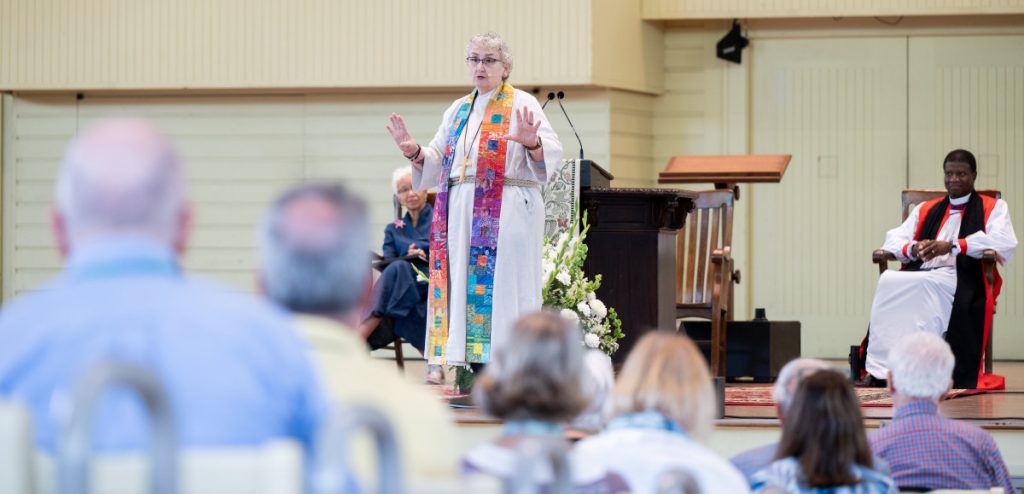
Column by Mary Lee Talbot
Three people approached the edge of the Grand Canyon. The first person, a naturalist, said, “We have to protect this magnificent place for our descendents and their descendents to see.” The second person, an artist, said, “I can’t fathom God’s paint brushes. To create something like this would take my whole life to paint.” The third person, a rancher, said, “Damn bad place to lose a cow.”
The Rev. Karyn L. Wiseman said that “looking at the Grand Canyon is all about perspective. What you see all depends on your perspective.” Wiseman preached at the 9:15 a.m. Friday morning worship service in the Amphitheater. Her sermon title was “Overflowing Cups,” and the scripture reading was Psalm 23.
The 23rd Psalm gives people comfort and peace. In the Christian tradition, it is often used at funerals. “We have heard it or recited it often. It is a psalm of trust,” Wiseman said. “It is often recited in Sunday school classes or memorized for confirmation. We think of it as peaceful, yet how peaceful is it? It talks about walking through the valley of the shadow of death and eating with our enemies.”
The psalm is used, she said, to remind us that God is with us. When Wiseman talked to her mother this week, her mother asked, “What is Chautauqua like?” Wiseman said, “It’s like a camp for adults to learn, serve, be fed by art, religion, knowledge and recreation.”
As Wiseman stepped on the Amp stage for the first time, she felt she was on holy ground. “It is humbling to be here. To remember the attack on Salman Rushdie and the people who rushed to his defense. You may disagree with what he has said and written, what I have said, what others have said. That’s OK, because this is a holy place.”
The 23rd Psalm has a place in religious life because it helps people understand how God operates. “God is not just present with us; God is guiding us with his rod and staff,” she said. “The Lord is my shepherd. This sentence is emphatic.” She asked the congregation to repeat the phrase four times.
Wiseman had a grandfather who was a cattle rancher, who wanted nothing to do with sheep. It was a myth, she said, that sheep are stupid. “They are very smart – for sheep.” She went to Palestine in March and she called the trip a preparation for Chautauqua.
While visiting Qumran, they saw many shepherds who were moving their flocks from one green pasture to another. As the group looked at the caves where the Dead Sea Scrolls were found, their guide, a Palestinian Christian, told them how the scrolls were found.
If a shepherd loses sheep near the caves, they throw a rock into the cave to scare the sheep into coming out.
“The shepherd who found the scrolls had thrown a rock to scare the sheep and heard a distinctive sound of pottery breaking. The hundreds of scrolls they found had been taken there to protect them, and a shepherd found them,” Wiseman said.
She said to the congregation: “Sometimes we feel like God has thrown a rock to get us back in shape, but as I said earlier in the week, that is not the way God works. Sometimes we walk in love and sometimes we walk in the valley of the shadow, but God is with us. God is the host at a banquet that includes our enemies.”
Jesus, she said, loved to tick people off by who he ate with. He ate with those who would never be invited to a banquet.
“It is always better to build a longer table than to build a wall. God is asking us, out of the grace we have received, to give back to the people we know – in our homes, and here. We can never run fast enough to get away from God. God created everything and created us to be stewards of creation,” she said.
Wiseman talked about the privilege of preaching, of breaking open the Gospels and the Hebrew Bible, and discovering the brokenness in the text. “God sent God’s son to be a broken vessel by which we are saved. Every time we break the bread and pour out the cup, we get into a deeper relationship with God.”
She continued, “I have to have brokenness to be an authentic preacher. The Lord is my shepherd. I shall not want. He anoints my head with oil. Man! I want to be sitting at the table that keeps getting longer, instead of building walls. I want to be at the table with that God.”
Again she asked the congregation to repeat “The Lord is my shepherd,” four times. “Amen,” she said and the congregation applauded.
Isabel Packevicz, student minister with the Department of Religion, presided. Welling Hall, a member of the Motet Choir who still has that Children’s School enthusiasm down in her heart, read the scripture. The prelude was “Pastorale, Op. 189, No. 1,” by Charles Villiers-Stanford, played by Joshua Stafford, director of sacred music and Jared Jacobsen Chair for the Organist, on the Massey Memorial Organ. For the anthem, the Motet Choir sang “The Lord is My Shepherd,” by Howard Goodall, used as the theme song for the BBC television show “The Vicar of Dibley.” Stafford conducted and Nicholas Stigall, organ scholar, accompanied the choir. The postlude was “Toccata,” from Symphony No. 5 by Charles Marie-Widor, played by Stafford. Support for this week’s chaplaincy and preaching was provided by the Robert D. Campbell Memorial Chaplaincy and the Jackson-Carnahan Memorial Chaplaincy.




